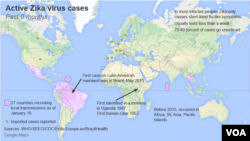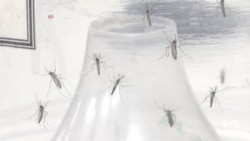The Red Cross has put out an emergency appeal for funding to help with the outbreak of the Zika virus, which could infect as many as 4 million people in the Americas this year.
The International Federation of Red Cross and Red Crescents Societies launched the appeal Tuesday for $2.3 million to support the regional response to the crisis.
The virus is believed to be linked to microcephaly, a neurological disorder in which babies are born with abnormally small heads.
On Monday the World Health Organization declared the spread of the Zika virus to be a global public health emergency and made the prediction that 4 million people could be infected this year.
Twenty-four countries had confirmed circulation of the Zika virus by the end of January. There is currently no treatment.
Research into vaccine
French pharmaceutical company Sanofi said Tuesday that it has begun research and development of a vaccine for the virus, which is named for a forest in Uganda where the mosquito-borne virus was first identified in 1947.
The Zika virus is transmitted by Aedes mosquitoes, which also cause dengue and chikungunya disease.
Monday in Geneva, the WHO said Zika is a "public health emergency of international concern." But it stopped short of calling for travel or trade restrictions.
No firm link has been established between the Zika virus and microcephaly, but it is hard to ignore a possible connection between the virus and this brain disorder.
Nearly 4,000 suspected cases of microcephaly have been reported in Brazil since October, compared with 150 similar cases in 2014.
Brazilian President Dilma Rousseff's chief of staff said Monday that pregnant women should not travel to Brazil for the 2016 Olympics because of the risk of contracting the virus.
Not ruling anything out
But WHO spokesman Gregory Hartl told VOA the surge in the number of microcephaly cases and the Zika virus may just be coincidental in terms of time and place. He cautioned, however, that experts are not ruling anything out.
"One of the curiosities is why we have so many neurological cases in, say, the northeast of Brazil, but we have not had it in other places," he said. "So, we really need to understand what is existing that causes these microcephaly cases, for example, in children."
Hartl dismissed fears that the Zika virus could pose a threat similar to that of Ebola, which caused more than 11,000 deaths in West Africa.
'Never killed a person'
He noted Ebola is transmitted person to person via infected bodily fluids and kills about 50 percent of its victims.
"Zika has never killed a person and it is transmitted by the mosquito," he said. "So, we know that there are those two fundamental differences at least. Let us say that Zika on its own would not be the consideration of an emergency committee. What is the concern to the international community is the possible link with neurological disorders."
Until there is a vaccine, Hartl said governments must stop the disease at its source by removing stagnant water where mosquitoes breed and fumigating houses to kill the mosquito.
He said pregnant women, in particular, should protect themselves by sleeping under mosquito nets, using mosquito repellents, and wearing long-sleeved shirts and pants.
WATCH: Related video on Ziki virus










